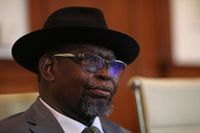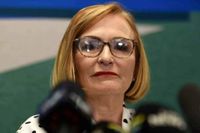The African National Congress (ANC) is poised to abandon its proposed 0.5% increase in value-added tax (VAT) following significant opposition from its coalition partners in the Government of National Unity (GNU), particularly the Democratic Alliance (DA). This decision comes after a series of meetings and discussions among key political players, highlighting the challenges the ANC faces in navigating its budgetary plans amid a fiscal crisis.
Originally, Finance Minister Enoch Godongwana proposed a 2% VAT hike in February 2025. However, after backlash from various political factions, this was scaled back to a plan for two 0.5% increases over the next two years. As of now, the ANC appears ready to scrap the proposal entirely, with a deadline of May 1, 2025, looming for businesses that had begun invoicing at the new 15.5% rate.
According to the Sunday Times, the ANC's decision to withdraw the VAT increase proposal is largely due to the DA's steadfast refusal to support any tax hikes. This resistance has forced the ANC to reconsider its position, as the party is now left with a R13.5 billion budget gap that it must address through alternative revenue sources. An insider from the ANC stated, "The VAT increase is dead. Treasury must find another way—R13bn is nothing in the bigger scheme." This sentiment reflects the urgency and gravity of the situation as the ANC grapples with fiscal pressures.
During a meeting held on April 12, 2025, between the ANC and the DA, both parties described the discussions as constructive but acknowledged their fundamental disagreements over the VAT increase. DA Federal Council Chairperson Helen Zille emphasized that the party would not support a VAT hike without meaningful reforms aimed at stimulating economic growth and job creation. Zille stated, "Both sides spoke respectfully yet frankly about the need to resolve the impasse over the budget and to enhance cooperation between the two parties in the context of the GNU."
The backdrop of this budgetary tussle is the broader political landscape in South Africa, where the ANC has faced increasing pressure from opposition parties. Despite the ANC managing to pass the budget in the National Assembly with the support of smaller parties like ActionSA and Build One South Africa (BOSA), both of these parties have also expressed their opposition to a VAT increase.
Political analysts have noted that the ANC's potential withdrawal from the VAT increase indicates a significant shift in its strategy, possibly reflecting a concession to the DA's position. Professor Ntsikelelo Breakfast remarked, "This signals that the ANC has given in to the demands of the DA because the DA, among others, has been vehemently opposed to a VAT increase." Meanwhile, another analyst, Sandile Swana, characterized the VAT debate as "mischievous," arguing that the fiscal shortfall is not a national crisis, suggesting alternative routes for revenue generation.
As the ANC prepares to formally withdraw the VAT proposal, Finance Minister Godongwana must now devise a new strategy to fill the budget gap before the upcoming National Assembly meeting on May 6, 2025. Suggestions for alternative solutions have surfaced, including calls for an emergency budget similar to those enacted during the COVID-19 pandemic. Economist Duma Gqubule has advocated for this approach, emphasizing the urgency of the fiscal situation.
In the wake of the ANC's shifting stance on VAT, the Congress of South African Trade Unions (Cosatu) has welcomed the potential scrapping of the increase, arguing that it would alleviate the financial burden on millions of workers already struggling with rising living costs. Cosatu spokesperson Matthew Parks stated, "We welcome the government and Parliament's endorsement of Cosatu's call for progressive alternatives that will ensure the state has the resources it needs to deliver quality public services, stimulate the economy, and tackle unemployment."
As discussions continue, the ANC remains open to dialogue with various political factions. ANC spokesperson Mahlengi Bhengu indicated that the party is committed to finding common ground and solutions that prioritize the interests of South Africans. The reconfiguration of the GNU has also been a topic of conversation, with the ANC seeking to reset its relationships with coalition partners and reinforce accountability within the government.
However, the DA's firm stance against the VAT increase and the lack of support from other parties indicate that the ANC will need to navigate carefully as it seeks to address its budgetary challenges. The political dynamics within the GNU have reached a critical juncture, and the outcome of these negotiations will have significant implications for South Africa's fiscal health and governance.
As the May 1 deadline approaches, the pressure is on Godongwana and the ANC to act swiftly and decisively. With the future of the VAT increase hanging in the balance, the stakes are high for all parties involved, and the decisions made in the coming weeks will shape the economic landscape of South Africa for years to come.






